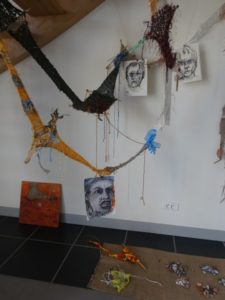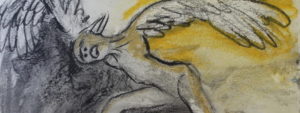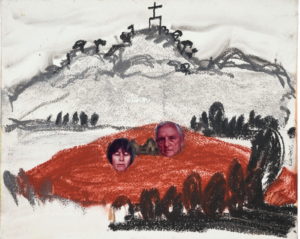
My installation, Surviving Monsters at Peleyre Gallery, is not about me but about the journey through life.
What is my novel?
“How much of your novel is an autobiography?”
It’s a good question to ask a writer.
A good question
It was asked at the launch of The Tin Heart Gold Mine, but it’s not a simple question to answer. I immediately wanted to ask the other writers there what they thought. It’s easier to answer this question sideways by referring to other authors and other books. I’ve just finished reading The Ginger Tree by Oswald Wynd. I loved the book, but, as a writer, I wanted to ask Wynd how he arrived at the main character. Did he know someone like that? Did he research the character? Was she entirely imagined? Was she a female version of himself? How many genders, generations, epochs and eras and cultures must a writer experience before they can write about it? How fictional can fiction be?
Fiction, non-fiction and autobiography
There are many ways in which the writing of fiction differs from the writing of an autobiography. To complicate it further, both fiction and autobiography have many differing and shared elements that go into their construction. What they have in common is that they are both constructions – artificial and invented structures for telling a story. Writers construct these inventions – story nests if you like – from their own breast feathers, lay their eggs in them, incubate them, hatch them by chipping at the shells and then feed their story babies with half-digested regurgitations from their own bodies. Then, of course, – though that will have to be another post – they worry that the wretched creatures won’t fly when pushed out of the nest.

The struggle to fly – part of a series of drawings based on the idea of Icarus.
Autofiction
Marjane Satrapi, a writer and artist I admire, author of Persepolis said this:
“I don’t like the term ‘autobiography’. I rather like the term ‘autofiction’. The second you make a script out of the story of your life it becomes fictional. Of course, the truth is never far. But the story is created out of it.”

A mixed media drawing with collaged photos of myself and my father from Finding Fathers installation. It is not about me but about the relationship of landscape and family to each other
It very well illustrates the predicament I found myself in when I completed my unpublished novel, The Love and Wisdom Crimes. It was a fictionalised memoir. I chose to write it that way so not to distress people who were still alive. I changed names and the times of some events. For a while afterwards I felt that I had altered my own past history. I couldn’t remember what had really happened and what I had written but disguised. It frightened me because there is another very important reason that we write both fiction and autobiography. The reason is that both connect us into time – past, present and future. Storytelling in any form – sung, recited or read – connects us with the time before us and the people in our future. We are all troubadours and minstrels singing our poetry about life. V S Naipaul said that fiction tells us the truth about the author while Philip Guedalla says autobiography tells the truth about the people the writer knows.
Novels are about the author or not?
The Tin Heart Gold Mine is not autobiographical. The main character, Lara, is not me though she, too, is an artist. There are, however, two things that happen to her that happened first to me. One is her drive through the riots from the airport to the city. The other is her walk through the buffalo herd. The London flat that Lara and Tim live in is one that I knew well, but the furniture, use of the rooms and what happens in them is all invented.
There is much more to say on this subject – I hope that perhaps, it will provoke a discussion and comments.
4 Comments on “My story, is it a memoir, an autobiography, or a novel?”
Ruth, I think we all draw from our own life’s experiences from time to time – sometimes without realizing we’re doing it. Some of my relatives sneak into my stories or I steal some of their characteristics. I believe that our imagination, which is where our stories really come from, is a huge filing cabinet of things stored away and the more you’ve lived the fuller those cabinet drawers are, with a wealth of information to put flesh on the bones of our stories.
I think it’s a really interesting discussion to have with other writers – how we each manage to separate our real lives and our writing – if we do!
I have no imagination so am in awe of those who do. Although I have written extensively in academia, my words are all based around concrete facts and how to present them in such a way that the reader finds engaging. However there are some similarities, it is very easy to confuse personal and professional facts, the knowing and experience knowing are two very different beasts. Would love to be creative, my world is very black and white.
I think you are right – it is easy to confuse facts and fiction, personal and professional – luckily writers don’t have to make distinctions that are too clear – so often we write about what is on the boundaries of those ideas.